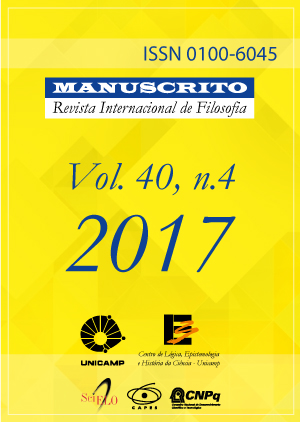Resumo
According to G.E. Moore’s ‘Open Question’ argument (OQA), moral facts cannot be reduced or analyzed in non-normative natural terms. Does the OQA apply equally in the epistemic domain? Does Moore’s argument have the same force against reductionist accounts of epistemic facts and concepts? In a recent article, Daniel Greco has argued that it does. According to Greco (2015), an epistemological version of the OQA is just as promising as its moral cousin, because the relevant questions in epistemology are just as ‘open’ as those in ethics. In this paper, I offer a two-part reply to Greco. First, I argue that his argument in favor of the openness of epistemology is not persuasive. Second, I offer a case against the openness of epistemology. Unlike claims linking natural and moral properties, claims linking natural and epistemological properties do give rise to closed questions. An epistemological OQA is therefore not as promising as its moral cousin.Referências
CHRISMAN, M. "From Epistemic Contextualism to Epistemic Expressivism." Philosophical Studies 135 (2): 225-254, 2007.
CÔTÉ-BOUCHARD, C. “Can the Aim of Belief Ground Epistemic Normativity?” Philosophical Studies 173: 3181–3198, 2016.
CUNEO, T. 2007. The Normative Web: An Argument for Moral Realism Oxford University Press, 2007.
GIBBARD, A. Wise Choices, Apt Feelings: A Theory of Normative Judgment Harvard University Press, 1990.
GIBBARD, A. "Truth and Correct Belief." Philosophical Issues 15 (1): 338-350, 2005.
GRECO, D. "Epistemological Open Questions." Australasian Journal of Philosophy 93 (3): 509-523, 2015.
GRIMM, S. "Epistemic Normativity." In Epistemic Value, edited by Adrian Haddock, Alan Millar, and Duncan Pritchard, 243-264: Oxford: Oxford University Press, 2009.
HATTIANGADI, A. Oughts and Thoughts: Rule-Following and the Normativity of Content. Oxford University Press, 2007.
HEATHWOOD, C. "Moral and Epistemic Open-Question Arguments." Philosophical Books 50 (2): 83-98, 2009.
JENKINS, C. S. “Epistemic Norms and Natural Facts.” American Philosophical Quarterly 44 (3): 259 – 272, 2007.
KELLY, T. "Epistemic Rationality as Instrumental Rationality: A Critique." Philosophy and Phenomenological Research 66 (3): 612-640, 2003.
KIM, J. "What is Naturalized Epistemology?" Philosophical Perspectives 2: 381-405, 1988. LEWIS, D. Counterfactuals. Oxford: Basil Blackwell, 1973.
LITTLEJOHN, C. Justification and the Truth-Connection Cambridge University Press, 2012. MOORE, G. E. Principia Ethica Dover Publications, 1903.
RIDGE, M. "Expressivism and Epistemology: Epistemology for Ecumenical Expressivists." Aristotelian Society Supplementary Volume 81 (1): 83-108, 2007.
SELLARS, W. S. "Empiricism and the Philosophy of Mind." Minnesota Studies in the Philosophy of Science 1: 253-329, 1956.
STREET, S. "Evolution and the Normativity of Epistemic Reasons." Canadian Journal of Philosophy 39 (sup1): 213-248, 2009.
SUTTON, J. “Stick to what You Know.” Noûs 39 (3): 359-396, 2005.
WILLIAMSON, T. Forthcoming. "Justifications, Excuses, and Sceptical Scenarios." In The New Evil Demon Problem, edited by Fabian Dorsch and Julien Dutant: Oxford University Press.

